商会在“欧盟动态”发表评论文章
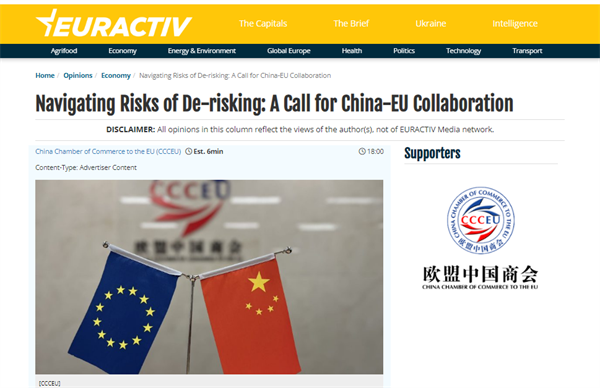
Navigating Risks of De-risking: A Call for China-EU Collaboration
DISCLAIMER: All opinions in this column reflect the views of the author(s), not of EURACTIV Media network.
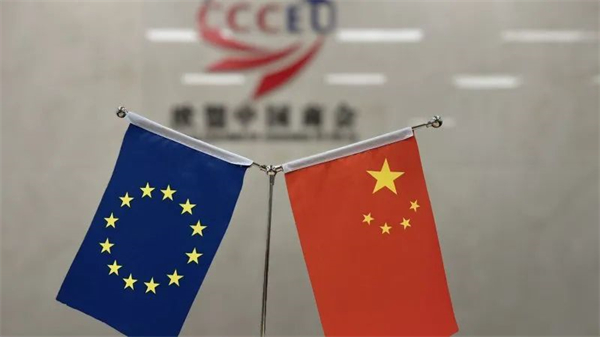
[CCCEU]
Since European Commission President von der Leyen introduced the concept in her dedicated speech on EU-China ties in March 2023, the mantra "De-risking but not decoupling" has become a central tenet in the EU's approach to China.
By the China Chamber of Commerce to the EU.
This approach has not only permeated the EU's playbook but has also found its way into the G7's official statement and garnered a notable endorsement from Washington.
Many of the EU bubble's China-goers spent quite some time in Beijing trying to convince their Chinese counterparts that this approach is country-agnostic and only aims to increase the EU's resilience. However, these efforts seem to have yielded limited success, as China expresses caution, asserting that the purportedly neutral stance is merely a façade for decoupling, posing potential harm to the stability of global supply chains.
Such suspicions find an early validation in a comment from Bruegel in June, suggesting that while de-risking may ostensibly aim to shift from a focus solely on cost optimisation to one also emphasising resilience, it could also serve as a cover for protectionist measures.
The broader implications of this approach raise concerns, as estimates from an IMF blog post in October indicate that the adverse effects of ‘de-risking' strategies are not confined to China alone but are poised to exert a substantial drag on global growth. The combined scenarios of "friend-shoring" and "re-shoring" are anticipated to result in approximately 6% loss of global GDP.
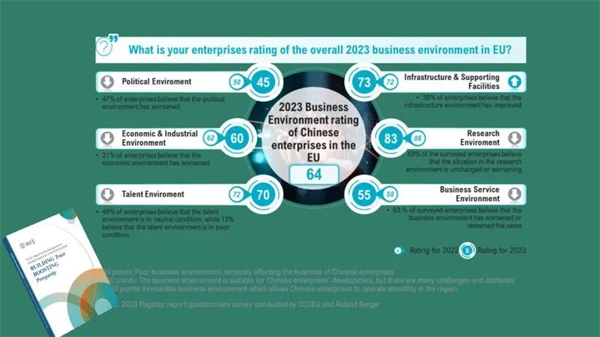
[CCCEU]
The repercussions of Brussels' pivot towards de-risking are evident on the ground. Recent findings from the CCCEU's survey conducted between July and October reveal that 72% of Chinese companies feel negatively impacted by the EU's "de-risking" strategy. Breaking down the impact, 37% cited repercussions in the trade sector, 36% felt disadvantaged in market competition, 26% reported constraints on their investments in the EU, while 21% indicated hindrances in engaging in public procurement within the EU.
Regrettably, this sentiment cast a pall over the EU's overall business environment, as highlighted in the CCCEU's annual flagship report released on November 14, showcasing declines for the fourth consecutive year. The report, titled "Building Trust, Boosting Prosperity-CCCEU Report on the Development of Chinese Enterprises in the EU 2023/2024," not only unveils the concerning downturn but also provides a comprehensive analysis of the EU's political, research, human resources, economic and industrial, infrastructure and support, and business service environments. Drawing insights from a survey involving 155 Chinese companies and supplemented by in-depth interviews with approximately 30 enterprises and organizations, the report offers a nuanced perspective on various facets of the EU's business landscape.
As the EU endeavours to reduce its reliance on China, particularly in the crucial realms of green and digital transitions pivotal to its de-risking strategy, obstacles have arisen in sectors where Chinese enterprises excel. One notable instance is Brussels' ongoing anti-subsidy investigation into China's battery electric vehicles, instigating uncertainties and widespread apprehensions concerning the sustainable development of Chinese enterprises within the EU. Furthermore, in the digital sector, certain Chinese companies have been dubiously labeled as "high-risk vendors" without concrete legal evidence, a move that stretches the concept of "national security" and has left Chinese technology firms operating in Europe deeply disillusioned.
The deteriorating business environment, according to surveyed Chinese enterprises, is linked to a deepening trust deficit between Brussels and Beijing, exacerbated by pandemic-induced restrictions hindering communication and exchanges. The EU's perception of China as more of a systemic rival than a reliable partner has intensified the challenges faced by businesses operating in this environment.
However, there is potential for improvement. The CCCEU report puts forth around 200 recommendations to advance the development and cooperation between China and the EU. These suggestions are aimed at both governments and Chinese enterprises in the EU, covering nine key aspects. These aspects include fortifying mutually beneficial trade and economic development, aspiring towards a sustainable world, nurturing a digital future, invigorating the business environment, revitalising and deepening communication to strengthen bilateral ties, ensuring fair and open markets through dialogue and collaboration, intensifying science and technology innovation, stabilizing the global supply chain, and rebuilding mutual trust for a shared future. The recommendations are crafted with the aspiration that China and the EU can achieve synergistic effects in their collaboration, resulting in shared prosperity that surpasses the sum of its parts.
In the midst of these challenges, Chinese companies maintain an optimistic outlook on the future of China-EU business, economic, and trade relations. Even in the face of numerous challenges, over 60% of respondent enterprises express optimism regarding the mid-and long-term prospects for China-EU trade and economic ties. An overwhelming 94% of surveyed enterprises believe that the European market will assume a more significant role in their global expansion over the next one to three years. Additionally, 83% have concrete plans to expand their presence in the EU. These survey results paint a vivid picture of potential growth and collaboration between Chinese and European markets.
The 20th anniversary of the comprehensive strategic partnership between China and the EU, coupled with a resurgence in high-level meetings, sets the stage for a long-awaited China-EU summit at the year's end. This juncture presents a timely opportunity to mitigate the risks associated with de-risking, actively fostering mutual trust to propel prosperity for a shared future.
译文
规避"去风险化"风险,呼吁中欧合作共赢
作者:欧盟中国商会
摘要:欧盟对华去"风险化"政策引起广泛质疑,其负面影响令人担忧。面对挑战,欧盟中国商会年度旗舰报告提出了170余项改进建议,旨在实现中欧共同繁荣。报告表示,中国企业对欧洲市场持乐观态度,但表示存在不少阻碍。2023年是中欧建立全面战略伙伴关系第20周年,双方合作到达关键时刻。
自欧盟委员会主席冯德莱恩在2023年3月的一次专题演讲中提出这一概念以来,"减少风险但不脱钩"的口号已经成为欧盟对华政策的核心原则。这一方法不仅渗透到了欧盟的工作指南中,还进入了G7的官方声明,并得到了华盛顿的明显支持。
欧盟近期访华官员花费了相当多的时间,试图说服他们的中国同行,"去风险"是不针对特定国家,只为增强欧盟的韧性。然而,这些说服似收效甚微。中方表示对该政策需要保持谨慎,认定这种所谓的中立立场只是对脱钩的伪装,表示该举可能对全球供应链的稳定造成一定威胁。
这种质疑在今年六月布鲁盖尔智库的一篇评论中得到初步验证,该评论指出,如果去风险从单纯关注成本优化转向强调韧性,它可能成为贸易保护主义措施幌子。
"去风险"政策影响之广引起不少担忧,例如国际货币基金组织(IMF)10月的一篇博客文章估计,"去风险"战略的负面影响不仅限于中国,而且还将严重拖累全球经济增长。"离岸外包"和"回流"综合情况预计将导致全球GDP约6%的损失。
欧盟对华政策转向"去风险化"的影响在现实中显而易见。根据欧盟中国商会(CCCEU)在7月至10月调查发现显示,72%的受访中企反馈受到"去风险化"战略影响。具体而言,37%的企业表示在贸易方面产生影响,36%的企业感到在市场竞争中处于不利地位,26%的企业报告该政策对其在欧盟投资的限制,而21%企业表示在欧盟的公共采购中遇到障碍。
遗憾的是,这种不安也给欧盟的整体商业环境蒙上了阴影,正如欧盟中国商会11月14日发布的年度旗舰报告所强调,在欧中企对欧盟商业环境评分连续第四年下降。这份名为《共筑互信之路,共创中欧繁荣——欧盟中国商会中国企业在欧发展2023/2024》的报告,不仅揭示了令人担忧的经济下行趋势,还对欧盟的政治、研究、人力资源、经济和工业、基础设施和支持以及商业服务环境进行全面分析。该报告从155家中国企业的调查中得出见解,并辅之以对约30家企业和组织的深入采访,从不同角度对欧盟商业环境进行了细致的分析。
随着欧盟努力减少对中国的依赖,特别在绿色和数字转型等中国企业有优势的关键领域,出现不少障碍。其中,一个值得关注的案例是欧盟正在对中国电动汽车进行的反补贴调查,该调查引起中国企业对在欧盟发展的不安。此外,在数字领域,在没有具体法律依据的情况下,部分中企被无端地贴上了"高风险供应商"标签,这一扩大"国家安全"的概念的做法使在欧中国科技公司深感失望。
根据受访中企,不断恶化的商业环境与欧盟和中国之间不断加深的信任赤字有关。疫情引发的各种限制阻碍了沟通和交流,加剧了这种信任赤字。欧盟认为中国更像一个系统性竞争对手而不是可靠的合作伙伴,加剧了企业面临的挑战。
不过该环境依然有改善的可能。欧盟中国商会年度旗舰报告对欧盟和在欧中企等提出了约200项建议,以促进中欧发展和合作。报告围绕共谋经贸蓬勃发展、共促全球绿色可持续发展、共创数字未来、共同激发营商活力、共焕新且深化交流、共商共筑公平开放市场、共建科技创新合作、共同维护全球供应链稳定、共享共赢、互信互通等九个方面提出建议。这些建议旨在促成中欧双方在合作中实现协同效应和共同繁荣。
尽管面临众多挑战,中企对中欧未来经贸关系仍保持乐观态度。超过60%的受访企业对中欧经贸关系的中长期前景表示乐观。高达94%的受访企业认为,未来一到三年,欧洲市场将在其全球扩张中扮演更重要的角色,83%的企业有扩大在欧盟业务的具体计划。这些调查结果生动描绘了中欧市场增长和合作的潜力。
今年是中欧建立全面战略伙伴关系第20周年,近期高层会晤重新频繁,期待已久的中欧领导人会晤或将于年底举行。在这一关键时刻,在欧中企呼吁欧盟及时规避去风险策略所带来的风险,增进中欧互信,推动共同繁荣。

 登录
登录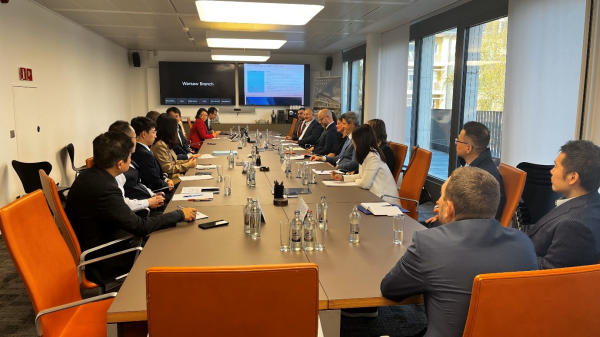 欧盟中国商会金融工作组与高伟绅律师事务所在卢森堡联合举办“欧盟银行业监管动态专题圆桌会”
欧盟中国商会金融工作组与高伟绅律师事务所在卢森堡联合举办“欧盟银行业监管动态专题圆桌会”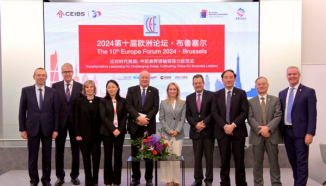 应对时代挑战:中欧商界领袖领导力新范式——2024第十届中欧“欧洲论坛”在布鲁塞尔和上海双城连线举办
应对时代挑战:中欧商界领袖领导力新范式——2024第十届中欧“欧洲论坛”在布鲁塞尔和上海双城连线举办



